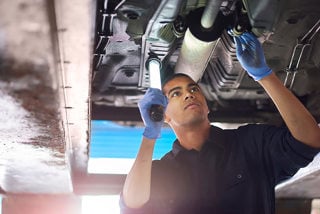The UK new car market should be prepared for a potential drop of 96% during the coronavirus lockdown, as experienced in China, says PSA Group's UK MD.
In an exclusive interview, Alison Jones, responsible for the Peugeot, Citroen and DS Automobiles brands in the UK, warned that although the UK new car market appears to be 30-40% down this month that is “masked by the fact that the industry had a good start to the month”.
“If you look at what's happening in some of the other countries that have gone into lockdown the industry stats show that day by day they're locked down the market is down 96% because they're dealing with the health crisis so we have to plan for that, that's on a day-by-day basis.”
The coronavirus shutdown in China caused domestic sales to drop 96% in the first week of February, while overall sales for February fell 80% year-on-year, according to the China Passenger Car Association.
Jones said it was “really hard to predict” where the UK market would be by year-end and it would depend on how long the lockdown lasts.
She stressed that it was important for manufacturers and car retailers to “ready themselves” for the restrictions being lifted by putting measures in place to “do things in a different way”.
PSA Group has already put new health and safety measures in place to restart vehicle production when the time is right. These measures include taking the temperature of staff, requiring them to wear masks on site and respecting safety distances between people.
These measures could, potentially, be adopted by individual car retailers too.
“We have a role to play, along with other companies and employers, to try and get the economy back running again once we get through the health crisis,” Jones said.
“This crisis is on a scale that many of us have never seen as a country and a community so our biggest priority is to keep our employees and our customers safe so we're really focused on that.
“Then, secondly, it's how you can keep your business and your teams together and running and focused on what they can do. In any situation like this it's about coming together, having clear steering and then being able to move through the other side.”
Key workers ‘prioritised’ for vehicle orders
PSA and many of its retailers have shifted to selling cars online. However, it could be some time before orders are fulfilled as the Government has asked manufacturers not to handover cars as that is classed as ‘non-essential’ activity.
The exception is vehicle orders for key workers, such as van delivery drivers, and PSA said that they were being prioritised during the crisis.
It currently has vans available in the country so orders can be “turned around very quickly” and deliveries are being done in line with the latest UK Government guidance.
“Vans are seen more visibly now as lifeline, they’re an essential service to many of us who are in our home, and that’s why we’ve still got the ability to provide additional vans to customers if they’re classified as essential,” Jones said.
“We've seen an increase in the number of customers that want to borrow vans on flexible rental terms. Different businesses are having to increase their services so we're able to do that for them and we've got all our protocols and all the safety to be able to do that.”
PSA is also keeping a “core” network of aftersales businesses open across the country, along with its roadside team, to ensure key workers can “keep moving”.
Its aftersales businesses are working to Government guidelines, including cleanliness and sanitation and ensuring that staff are two metres apart. Vans which are brought in have to be left for three hours before somebody else can get in them.
“You can’t just jump in a van, take it into the workshop and turn it around at speed, it requires quite a different way of thinking, the logistics are quite different,” Jones said.
Parts continue to be available through PSA’s parts warehouses and parts hubs.
“We have enough colleagues and enough processes that mean we can get parts or service facilities to a customer as and when they need it if they’re a key worker and it’s an essential service,” Jones said.
“When we could see what was happening in other countries we pulled more parts across into the UK so if the borders did close we had more parts in the UK and then we looked to move them into the regional and local areas in case anybody was sadly affected by coronavirus and one part of the chain had to be isolated for staff.
“We got them as far out as we possibly could so we could protect colleagues if we had to close the site and that we could serve our customers as well.”
Contract extensions available for fleet customers
Corporate customers who finance their vehicles through PSA have the option of extending contracts during the coronavirus lockdown.
Those that wish to place orders can do so through the fleet business centre and the fleet field sales team is “fully operational” and keeping in contact with customers through electronic means, Jones said.
Within PSA, technology has also proved vital as a means of communication and Jones believes there could be long-term positive benefits.
“Some of the technologies that we're using to keep in touch could make us really efficient. I don’t think it will fully replace (face-to-face), I think we all like to be out and sociable as well and you can get things done in a room in a collaborative way quite differently to doing it remotely.
“But I think there will be some big learnings that come out of this for us as a society, then us as a community.
“We need to deal with the crisis but then adapt as well for the future and that's what we're thinking about in PSA and working on.”
- To find out about PSA's mobility plans, see the forthcoming April issue of Fleet News.
If you’re a fleet decision-maker, please take three minutes to complete our coronavirus survey.
For the latest coronavirus advice for fleet operators, click here.
For the latest coronavirus-related news, click here.





















Login to comment
Comments
No comments have been made yet.